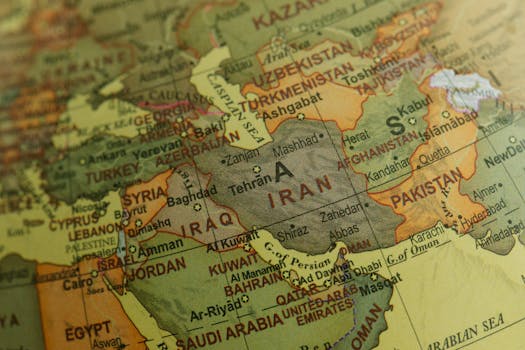
**
Introduction:
The recent U.S. military strikes targeting Iranian-backed militias in Syria and Iraq have sent ripples through the geopolitical landscape. However, surprisingly, global markets have largely shrugged off the escalation, exhibiting a remarkable degree of resilience. This seemingly paradoxical reaction prompts a crucial question: why are global markets brushing off the increased tensions between the U.S. and Iran? Understanding this requires a deeper dive into the complexities of the current economic climate, investor sentiment, and the perceived limited impact of the strikes on oil supply and global trade. This article will explore the key factors contributing to this market nonchalance, examining the role of oil prices, geopolitical risk assessment, and the broader macroeconomic picture.
Limited Impact on Oil Prices: A Key Factor
One of the primary reasons for the muted market reaction is the relatively limited impact of the strikes on oil prices. Historically, escalating tensions in the Middle East have resulted in significant oil price spikes, given Iran's role as a major oil producer and exporter. However, this time, the response has been far more subdued. Several factors contribute to this:
- Increased Global Oil Supply: Global oil production has increased in recent years, mitigating the potential impact of any supply disruption from Iran. Major producers like Saudi Arabia have consistently demonstrated a commitment to maintaining sufficient supply to meet global demand.
- Strategic Petroleum Reserve: The existence of strategic petroleum reserves in various countries provides a buffer against potential supply shocks, reassuring markets that short-term disruptions can be managed effectively.
- Market Anticipation: Markets often anticipate and pre-price potential geopolitical risks. The current situation, while tense, may not represent a significant deviation from previously assessed levels of risk. This could explain why prices haven't dramatically escalated.
Geopolitical Risk Assessment: A Calculated Calm
While the strikes represent a clear escalation, the scale and nature of the actions are being carefully assessed by investors. Unlike previous instances of direct military conflict, these strikes were targeted and arguably less likely to spark a wider regional conflict. This nuanced perspective shapes market sentiment.
- De-escalation Efforts: There are ongoing efforts by regional and international players to de-escalate the situation. These efforts, however subtle, are being perceived by investors as potentially effective in preventing the conflict from further escalating.
- Iran's Restrained Response: Iran's response so far has been largely measured, avoiding immediate and large-scale retaliation. This calculated approach has helped calm fears of a major conflict.
- Focus on Domestic Issues: Global investors are increasingly focused on domestic economic concerns, such as inflation and potential recessions in major economies. Geopolitical issues, while important, may be taking a backseat in the short term as investors prioritize immediate economic factors.
The Macroeconomic Context: A Bigger Picture
The relatively calm market response is also intertwined with broader macroeconomic trends. Currently, the global economy faces a multitude of challenges, including:
- Inflationary Pressures: High inflation rates in many countries are forcing central banks to raise interest rates, potentially slowing economic growth. This has a dampening effect on risk appetite, making investors less likely to react dramatically to geopolitical events.
- Supply Chain Disruptions: The lingering effects of the COVID-19 pandemic and the war in Ukraine continue to disrupt global supply chains. These challenges are seen as more pressing than short-term geopolitical volatility for many investors.
- Recessionary Fears: The possibility of a global recession looms large, further contributing to a cautious investor outlook. In this environment, geopolitical risks might be viewed as one factor among many and not necessarily a catalyst for immediate market shifts.
Long-Term Uncertainty Remains: A Cautious Optimism
While markets have shown remarkable resilience in the face of the recent strikes, it's crucial to recognize that long-term uncertainty persists. The situation remains volatile, and any miscalculation or further escalation could easily disrupt the current calm.
- Potential for Further Escalation: The risk of further conflict remains significant. Any major escalation, whether through Iranian retaliation or further U.S. actions, could trigger a much more dramatic market response.
- Impact on Global Trade: Even a limited escalation can disrupt global trade routes and supply chains in the region, causing ripple effects throughout the global economy.
- Energy Security Concerns: While oil prices have remained relatively stable, long-term concerns about energy security and the reliability of Middle Eastern oil supplies remain.
Conclusion:
The current market response to the U.S. strikes on Iran is a complex interplay of various factors. The limited impact on oil prices, a measured geopolitical risk assessment, and the overshadowing concerns of macroeconomic instability all contribute to the relative calm. However, this calm should not be interpreted as complacency. The potential for further escalation remains, and investors and policymakers alike must remain vigilant and prepared for potential disruptions. The ongoing situation necessitates continuous monitoring of both geopolitical developments and macroeconomic indicators to better understand their impact on the global economy. The markets' apparent nonchalance might be temporary, and a renewed focus on geopolitical instability could quickly reverse the current trend. It is a situation demanding continuous analysis and careful observation.


















